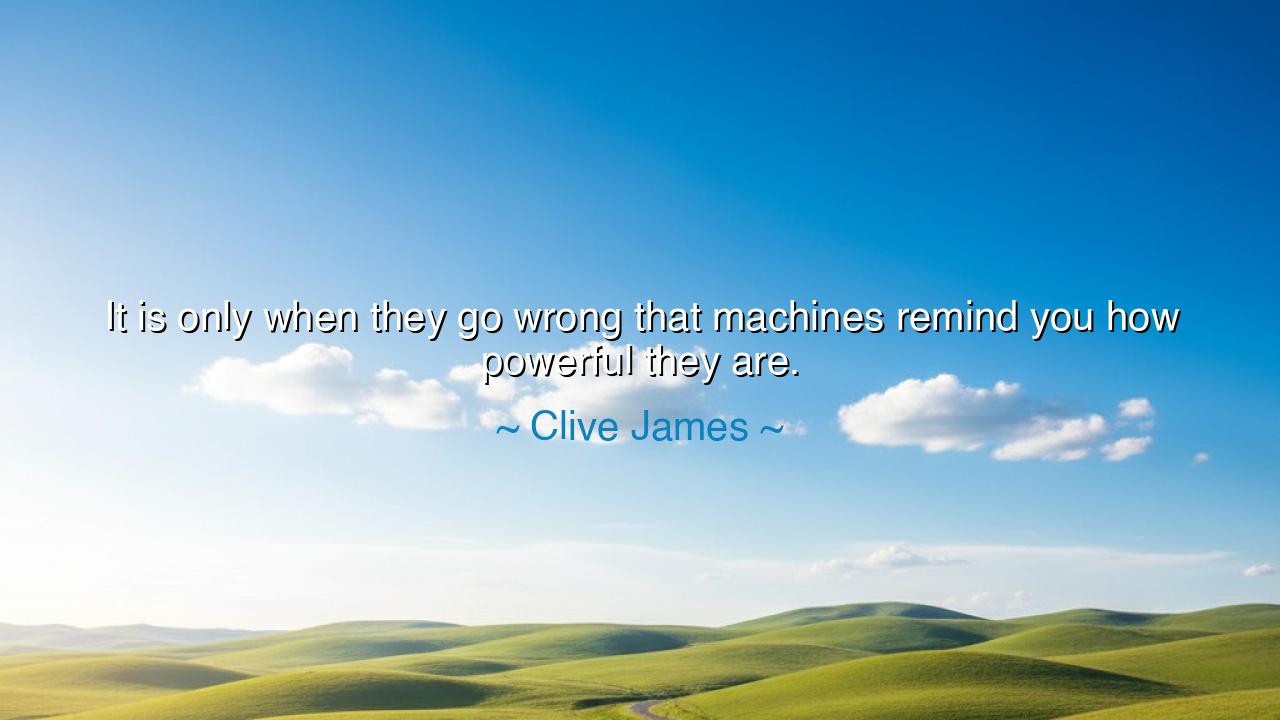
It is only when they go wrong that machines remind you how






Hear the wisdom of Clive James, who once wrote with both irony and gravity: “It is only when they go wrong that machines remind you how powerful they are.” These words strike with the force of paradox, for while machines serve us silently, faithfully, and without complaint, it is in the moment of failure that their true dominion is revealed. Humanity, so accustomed to their service, often forgets the extent of its dependence—until the day a machine falters, and the world trembles in response.
For what is a machine but an extension of man’s will? The plow cuts deeper than the hand, the engine runs faster than the horse, the computer calculates beyond the mind’s capacity. We wield them as tools, yet they wield us in return, shaping our societies, our labors, and our very ways of thinking. But when they cease to function—when the engine stalls, when the plane fails, when the network collapses—it is then that their hidden power is laid bare. We are confronted with the truth that our lives are interwoven with their strength, and without them, we are as fragile as in the days before their birth.
Consider the tragedy of Chernobyl in 1986. The nuclear reactor, a triumph of engineering, promised nearly limitless energy. Yet when its systems went wrong, it unleashed devastation that scarred land and lives for generations. In that moment, the world remembered the power of the machine—not as servant, but as destroyer. The very tool designed to serve humanity revealed, through its failure, the immensity of the forces it controlled.
Or recall the great Northeast Blackout of 2003, when millions were plunged into darkness across the United States and Canada. For years, electricity flowed like water, invisible and taken for granted. But when a single failure cascaded through the grid, whole cities ground to a halt: trains stopped, communications faltered, homes grew cold and dark. The silence of the machine was deafening, reminding all that the power they enjoyed was never truly their own, but borrowed from the systems they had built.
Clive James speaks, then, not only of machines but of human forgetfulness. We grow blind to the strength of the tools we wield because their service is constant. We call them ordinary, until their wrongness reveals their extraordinariness. The moment of breakdown is a moment of revelation: the machine shows its power not by working, but by failing.
The lesson is clear: let us not wait until failure to remember the might of what we create. Honor the power of machines in their silence, respect the risks they carry, and prepare for the day when they falter. For wisdom lies not in fear, but in foresight—in building safeguards, in respecting limits, in never mistaking reliance for invulnerability.
Practical steps follow: treat every tool with humility. Maintain the machines you depend on, but more importantly, maintain the awareness of their potential for both blessing and ruin. Cultivate resilience—learn skills that are not wholly bound to machines, so that when they fail, you may endure. And above all, guard against arrogance, for it is pride that blinds men to the hidden power of their own inventions.
Thus remember Clive James’ words: “It is only when they go wrong that machines remind you how powerful they are.” Take them not as cynicism, but as wisdom. For the true strength of humanity is not in denying the power of its creations, but in mastering it—acknowledging the danger, preparing for the failure, and using foresight to ensure that when the machine reminds us of its power, it does not do so through ruin.






AAdministratorAdministrator
Welcome, honored guests. Please leave a comment, we will respond soon